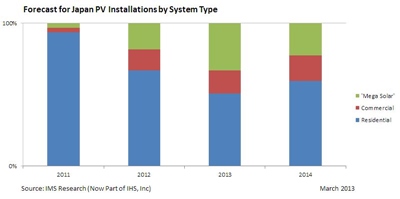Analyst warns of 'overheating' as Japan rushes to install PV 19 Mar 2013 Country set to become second-largest PV market after China this year, says IMS Research.

More than 5 GW of photovoltaic systems are set to be installed in Japan this year – making it the world’s second-largest PV market after China, but potentially setting up conditions for a subsequent crash if the market “overheats”.
According to the latest market predictions from analyst company IMS Research, Japan’s extremely generous feed-in tariff mechanism will see the country install more PV than both Germany and the US in 2013 as it seeks to diversify its energy production base.
That would represent year-on-year growth of 120 percent, and the prediction differs from a recent forecast by rival analyst Solarbuzz that suggested Japan would be the world’s fourth-largest installer of PV systems this year, behind China, Germany and North America.
IMS now says: “Benefiting from the world’s most attractive PV incentive policy, Japan’s solar market is currently booming, with installations expected to exceed 1 GW in the first quarter alone, causing it to become the second-largest market in 2013.”
Tariff-driven boom
The main reason for that boom is a generous feed-in tariff (FIT) paying up to ¥42 per kilowatt hour, even though this is likely to be reduced by approximately 10 percent from April.
“At ¥42 Japan’s FIT is by far the most attractive globally - overly generous perhaps, which could lead to overheating of the market,” said Ash Sharma, senior director of solar research at IMS Research, which is part of IHS. Such overheating has been seen with overly generous FiT rates previously – most notably in Spain five years ago, when a sudden boom in demand was followed by an even more rapid decline.
Sharma says that even the widely anticipated 10 percent reduction in tariffs in Japan would have little effect on market demand, partly because the subsidy mechanism allows installers who have already applied for the higher FIT to receive the current ¥42 rate, even if their systems are installed after April 1
As noted previously by Solarbuzz, the Japanese PV market favors more advanced, high-efficiency PV modules because of the restricted space available in many areas. IMS adds that that the generous tariff levels are providing something of a lifeline for domestic PV module makers who would otherwise struggle to compete with cheaper exports from China in particular.
“Residential system prices in Japan are roughly double those installed in Germany,” pointed out Sharma’s co-author Frank Xie. “The ability to sell modules and inverters at a significant premium compared to the rest of the world, coupled with high demand and growth, provides a much-needed profit stream for Japanese suppliers.”
Tough market for foreign suppliers
Sharma adds that Japan remains a tough market for foreign suppliers to penetrate, with a number of OEM agreements and partnerships with Japanese manufacturers in place – even if those foreign suppliers are highly regarded throughout the rest of the world.
“Simply put, Japanese customers want to buy Japanese modules,” Sharma said, adding that because foreign providers of inverters have found it even harder to serve the Japanese market because of tough regulations and stringent utility company requirements, there was now a bottleneck in inverter supply.
The IMS report says that larger projects of more than 2 MW in output capacity were proving to be a major driving force behind the country’s currently rapid growth of PV installations, although this feature of the market is expected to be short-lived and to decline from next year onwards.
“These so-called ‘mega-solar’ projects are being deployed at a rapid rate, and we expect they will account for approximately 25 percent of total demand in 2013,” Xie says. “Government policy is in clear support of these projects while the country grapples with severe energy shortages following its shunning of nuclear power. However, this is likely to be short-lived and decline after 2014 once the current pipeline of approved projects is completed, largely because of a shortage of land in the country.”
Rooftops
Commercial rooftop installations are also contributing to the rapid growth, Sharma added: “Systems in the range of 10-50 kilowatts are in very high demand in Japan due to high incentives, high electricity prices, power shortages for commercial properties and relatively simple regulations for installations of this size,” he said.
In general, IMS appears to be more optimistic than Solarbuzz in its forecast for the global PV market this year. IMS predicts that installations will rise from 32 GW in 2012 to 35 GW in 2013, compared with the respective Solarbuzz figures of 29 GW and 31 GW.
Both companies see China as the new driving force behind the global PV market, however, with the country set to rank as the world’s number-one installer in 2013.
• IMS Research's The Photovoltaic Market in Japan - 2013 edition is available now via the company's web site.





